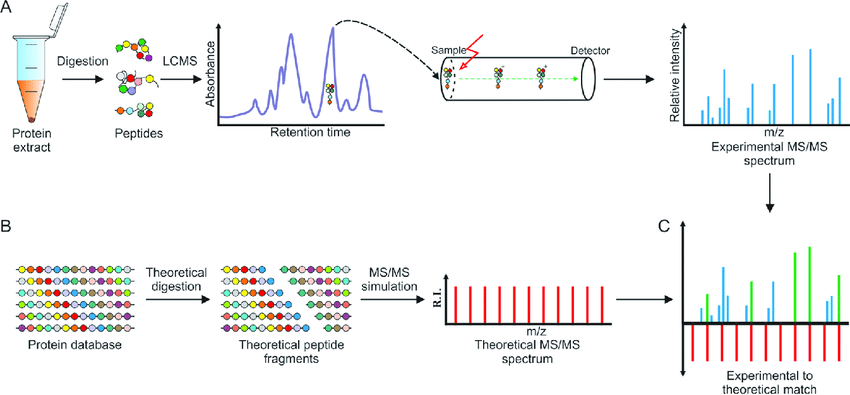Protein Mass Spectrometry Sequencing Service
Protein sequencing is crucial for understanding the functions and structures of biomolecules. Mass spectrometry, known for its high precision and sensitivity, is the preferred method for analyzing protein sequences. This technique employs both bottom-up and top-down strategies. The bottom-up approach cleaves proteins into shorter peptides via specific enzymes or chemicals, then measures their mass and matches them against database records to reconstruct the original sequence, excelling in detecting amino acid isomers and various post-translational modifications. However, it faces challenges in recovering complete sequences and detecting low-concentration proteins. The top-down approach, in contrast, analyzes entire protein molecules directly, employing techniques like electrospray or matrix-assisted laser desorption/ionization for in-depth sequence analysis.
Services at MtoZ Biolabs
MtoZ Biolabs offers comprehensive mass spectrometry-based protein sequencing services, aiming for precise amino acid sequencing of proteins, antibodies, and peptides. We utilize both proteomic strategies: enzymatic or chemical cleavage for the bottom-up approach, combined with mass spectrometry for sequence identification and modifications detection; and maintaining protein integrity for the top-down approach to achieve detailed structural insights.

Chugunova, A. et al. J Proteome Res. 2018.
Figure1. Protein Sequencing Principles
Experimental Instruments
1. Thermo Scientific™ Orbitrap Fusion™ Lumos™ Tribrid™
2. Bruker Daltonics timsTOF Pro
Analysis Workflow
1. Protein Digestion
Choose from a range of proteases—trypsin, chymotrypsin, Asp-N, Glu-C, Lys-C, and Lys-N—based on the sample and goals. Digest proteins under optimal conditions to ensure efficient peptide release.
2. Protein Dissociation
Generate b and y ions using High-energy Collisional Dissociation (HCD) in the Orbitrap system for comprehensive sequence coverage. Electron Transfer Dissociation (ETD) is then used to preserve sensitive post-translational modification sites.
3. Mass Spectrometry Data Collection
Post-HCD and ETD, collect data on the ions, which includes extensive information about protein sequences and modifications.
4. Data Analysis
Employ the Mascot search engine and Proteome Discoverer™ software for detailed data analysis.
Sample Submission Requirements
1. Pure Protein: ≥20 micrograms
2. Complex Protein Mixtures: ≥50 micrograms
3. Cell Lysates: ≥100 micrograms
4. Tissue Samples: ≥10 milligrams
*Avoid cleaners, descalers, and detergents.
Service Advantages
1. Advanced Technology Platform
We equipped with cutting-edge mass spectrometry equipment for ultra-high resolution and minimal mass error, ensuring highly precise analysis.
2. Efficient Sample Processing
Capable of processing hundreds of samples daily, our optimized workflows ensure rapid data output and high-quality results.
3. Stringent Quality Control
Achieves up to 99% accuracy and 98% repeatability, with comprehensive quality control to ensure reliable data.
4. In-Depth Data Analysis
Our bioinformatics team provides extensive support from data generation to detailed analysis, ensuring researchers understand their results thoroughly.
5. Customized Experimental Design
Tailored to meet diverse scientific needs, enhancing the scientific and cost-effectiveness of projects.
Applications
1. Precise Protein Identification: Identifies complex proteins in biological samples, crucial for understanding cellular functions and disease mechanisms.
2. Detailed Post-translational Modification Analysis: Advanced techniques provide deep insights into protein modifications and functional regulation.
3. Comprehensive Protein Quantitation: Reveals protein expression variations across biological states, supporting functional research.
4. Protein Interaction Networks: Clarifies interactions, providing key insights for understanding signaling and biological processes.
5. Support for New Drug Development: Offers scientific bases for target discovery and validation, speeding up drug development.
6. Biomarker Development and Validation: Identifies disease-related protein biomarkers, aiding early diagnosis and treatment.
MtoZ Biolabs, leveraging its expertise and experience in mass spectrometry protein sequencing, is committed to providing high-standard, personalized support for global researchers, pushing the boundaries of scientific research and advancing biomedical progress.
MtoZ Biolabs, an integrated chromatography and mass spectrometry (MS) services provider.
Related Services
How to order?







